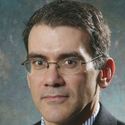 On Wednesday, October 17, Library Journal and School Library Journal will host “The Digital Shift: Libraries, Ebooks and Beyond,” our 3rd annual ebook summit. This online, all-day program will explore how libraries are navigating the transition from print to digital and integrating “e” into collections, catalogs and classrooms.
On Wednesday, October 17, Library Journal and School Library Journal will host “The Digital Shift: Libraries, Ebooks and Beyond,” our 3rd annual ebook summit. This online, all-day program will explore how libraries are navigating the transition from print to digital and integrating “e” into collections, catalogs and classrooms.
E-research and educational publisher Gale, part of Cengage Learning, is a gold sponsor of the event, and LJ asked Frank Menchaca, executive vice president and publisher for Gale, to discuss the company’s recent digitization projects—including the National Geographic Magazine archive and Nineteenth Century Collections Online—as well as the new Ed2Go college courses that Gale is offering through public library databases.
LJ: You’ve recently released magazine archives such as National Geographic Magazine archive and Liberty Magazine Archive. Do you have further plans in that regard?
Menchaca: We do. We view our efforts here as more than just reproduction of a publication. First, we choose materials of real cultural significance. National Geographic is an important magazine; its entire print run is a reflection of how the twentieth century West thought about people, cultures, wildlife and the planet. Similarly, Liberty magazine, tells us something about how American literature was conveyed to the culture in general. We are selecting materials for their cultural significance, and placing them in an environment where students and faculty can utilize and interrogate them as research resources. Over the next twelve months or so, you’ll see a lot more from us in this area. Gale is becoming the platform for bringing major cultural institutions, like National Geographic, into the library as research experiences. More than just creating digital surrogates of print publications, we are adding sophisticated research tools to the products that allow users to experience the content in a whole new way.
How has the reception been to digital presentations of print standards?
Very positive. Libraries are responding to the idea that the publications they’ve kept for decades in paper form are finding new lives as digital research materials. And as we link these resources to others, such as we do with Liberty in our Gale NewsVault product, their impact becomes even greater. Users can follow the development of particular ideas across a range of contemporary publications. It’s really enabling us to do intellectual history in a completely new way.
Tell us about the process of getting materials from worldwide personal and other small archives for presentation in databases such as Nineteenth Century Collections Online. Have you had a response from the historian community with regard to increased access to esoteric materials?
As you probably know, we work with editorial boards in the creation of all of our projects. As a traditional print reference publisher, Gale developed this as a core competency years ago and it’s one we’ve leveraged well into our evolution as a digital humanities research provider. Editorial acumen—intellectual structure, active participation in the scholarly community—is something that sets Gale apart from its competitors. In the case of Nineteenth Century Collections Online (NCCO), the editorial board we used was a reflection of the global historian community. They encouraged us to bring together disparate resources, ranging from the official (newspapers, government documents) to the personal (manuscripts, diaries, correspondence) so that we could approach the “story” of the nineteenth century in all of its multiplicity. So the community has been extremely responsive, largely because NCCO was, in a sense, created in cooperation with it, through the board. The same has been true of our Archives Unbound program, which now comprises several hundred projects, all of them small archives.
Gale recently started offering college courses through public library databases. Is this something the public has embraced? Have you had any commentary on that from the for-profit education market?
Gale’s Ed2Go program for public libraries has been very positively received, by librarians and patrons alike. Now, more than ever, people look to public libraries to build their life skills: language literacy, career development, and more. Gale has been fulfilling this need through products such as PowerSpeak and Career Transitions for quite some time. Ed2Go is a logical extension of that effort. We think public libraries in the digital age have an even great capacity to provide education and skill building.
With a full day of programming, including tracks designed specifically for public, academic and school libraries, professionals from administrative to administrators will find a wealth of new information, innovative ideas and best practices to put to use in their own libraries at The Digital Shift: Libraries, Ebooks and Beyond. Register at www.thedigitalshift.com/events/ebooks-and-beyond/


